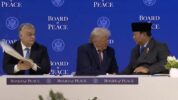Indonesia Loses Ground to Vietnam in FDI: Slow Licensing and Bureaucracy to Blame
JAKARTA, RAKYAT NEWS – Foreign investors are increasingly favoring Vietnam over Indonesia for direct investment, according to Bank Indonesia Governor Perry Warjiyo. Speaking at the KAFEGAMA Seminar in Jakarta on December 14, Perry identified two critical hurdles that deter investment in Indonesia: prolonged licensing processes and zoning regulations.
“Previously known as Building Permit (IMB), now the Building Approval (PBG) and spatial planning processes still take two to three years to complete,” Perry explained.
A 2023 report by the United Nations Conference on Trade and Development (UNCTAD) showed that Indonesia lags behind Vietnam in attracting foreign direct investment (FDI). Indonesia received FDI inflows amounting to $21.96 billion, compared to Vietnam’s $23.18 billion. Japanese and South Korean investors particularly lean toward Vietnam for sectors like electronics, textiles, and food services, citing Indonesia’s slow regulatory approvals as a significant disadvantage.
In contrast, Indonesia’s FDI performance still showcases substantial growth in other areas. Data from Indonesia’s Central Bureau of Statistics (BPS) indicates that FDI reached $50.2 billion in 2023, with Singapore emerging as the top investor, contributing $15.3 billion or 30.4% of the total. Perry acknowledged the importance of addressing these systemic challenges to remain competitive in the Southeast Asian investment landscape.
Vietnam’s competitive edge also lies in its proactive approach to attracting investors. The country’s streamlined processes and reduced bureaucracy have appealed to global companies, especially in manufacturing. Japanese and South Korean corporations often choose Vietnam due to its faster and simpler licensing systems, allowing for quicker operational kickoffs.
Meanwhile, China ranks as Indonesia’s second-largest investor, with $7.4 billion in investments, followed closely by Hong Kong at $6.5 billion. While these figures highlight Indonesia’s robust investment potential, they also underscore the need for reforms to further enhance its appeal to foreign investors.
Experts argue that Indonesia’s slow approval process, particularly in the construction and spatial planning sectors, poses a significant barrier to competitiveness. “Vietnam’s agility in catering to investor needs has set a benchmark for the region,” an analyst noted, urging Indonesian policymakers to prioritize reform.
To tackle these challenges, Indonesia has been exploring ways to improve its investment climate. Various reforms aimed at simplifying regulations and expediting approvals have been introduced but require consistent implementation to be effective. Perry emphasized that long-term solutions are essential to sustain investor confidence and boost economic growth.
Despite these challenges, Indonesia remains an attractive market due to its large domestic economy and strategic location. Sectors such as renewable energy and infrastructure development continue to draw significant interest from global investors. However, analysts stress that without addressing licensing inefficiencies, Indonesia risks losing out on significant FDI opportunities.
As the competition for foreign investment intensifies in Southeast Asia, Indonesia faces mounting pressure to streamline its processes and implement investor-friendly policies. With Vietnam already setting a strong precedent, Indonesia’s policymakers have their work cut out to bridge the gap and reclaim its position as a preferred destination for FDI in the region. (Uki Ruknuddin)



























Tinggalkan Balasan